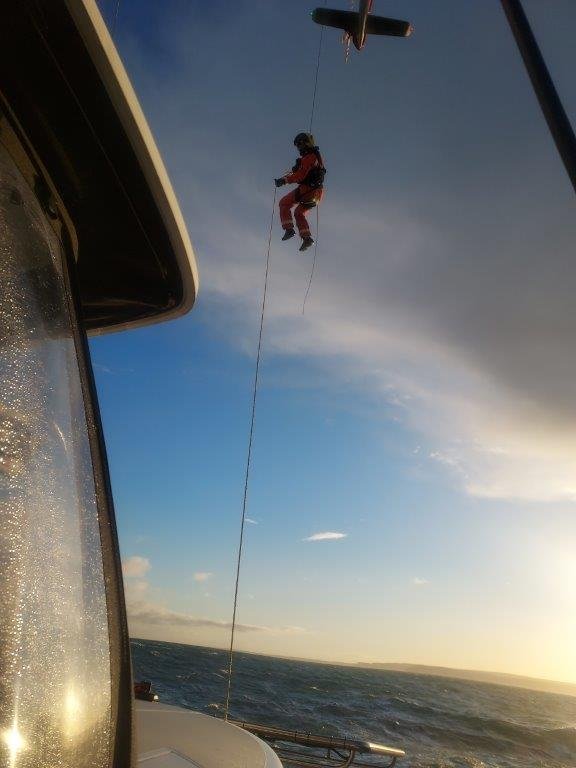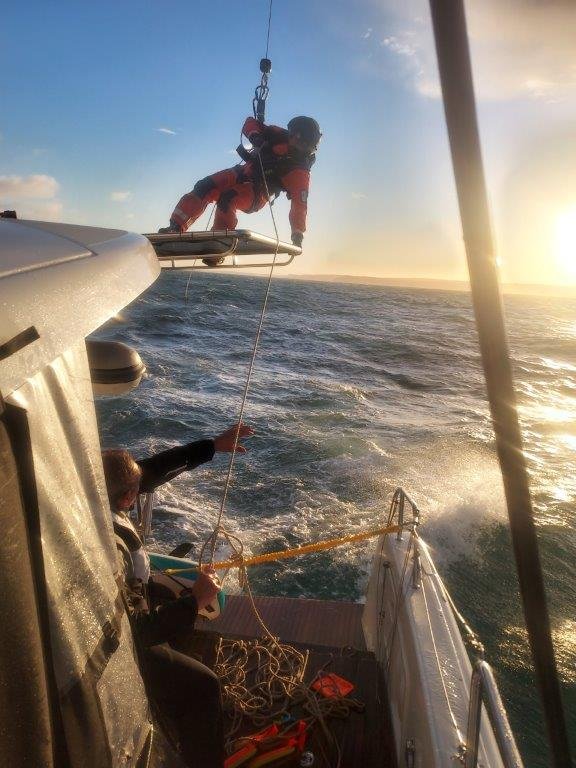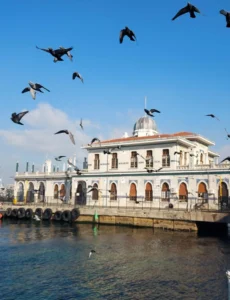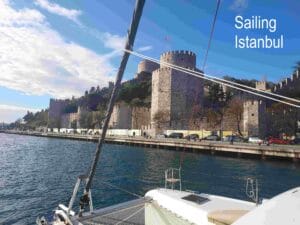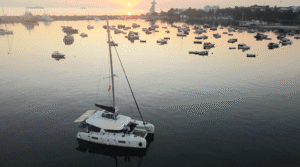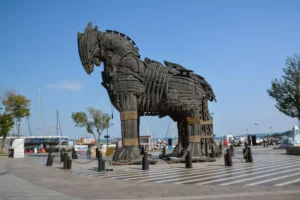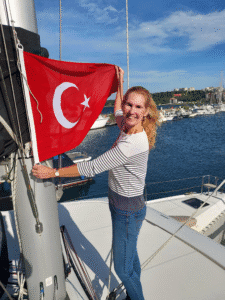The best sailingplan is to be 100% flexible, because at sea, every day works out different then expected. You have many unexpected moments. On the 3rd of December, one of those moments occured. We were sailing along the eastcoast of Scotland, from Whitehills to Peterhead. It was a sunny day, 30 knots of wind, we were going nice and fast!
A helicopter flew over us, came back and hovered about 30 meters above us and next to us. We waved to them, standing outside on our catamaran, not knowing exactly why they stayed so close to us…..
“Helicopter to Catamaran Horizon. Over”. Suddenly we heard this message directed to us on our VHF radio, via channel 16 that you normally keep your VHF tuned on being a sailing vessel. The helicopter turned out to be a Search and Rescue Helicopter (SAR) that flies along the coast of Scotland and above the North Sea to help vessels in distress.
We were not in distress at all, but we were one of the very few leisure sailing crafts that keep on sailing in December on the North Sea, so maybe they just wanted to check if everything was ok….?
To our surprise the pilot asked us if we wanted to participate in a training exercise with their helicopter. It was called a ‘boat transfer’s high line training’ that would take about 20 minutes. The procedure would be as follows: they first would let down a long rope from the helicopter to our catamaran which we had to catch and keep tight. Then their winchman Andrew (Andy) Cowx would go down that rope and who would land on our ship.
“ Sure, why not”, we thought and said! This was also a good exercise for us, in case when we are going to be in distress for real in the future, and have to rescued from our ship at sea. So we put on our lifejackets and were ready for action!
First we had to bring in our genoa sail, then steer the boat in northwest direction which was as close to the wind as possible. Next, Gilles went to the back of the catamaran where a rope was let down by the helicopter (at the end of the rope there was a weighted sandbag) which landed on the ship.
Thereafter, winchman Andrew came down the rope, stabilizing himself with his legs and arms to keep his sight directed to the ship as he tried to land on the ship. While Andrew was let down the rope, Gilles managed to keep the rope as tight as possible and I checked the surroundings for ships in the neighborhood or fishing nets in the water. And I was filming of course 😊.
Winchman Andrew managed twice to put his feet on the deck, but the solar panels blocked his room to move a little bit and also the helicopter had dropped to 25 meters above our boat and our mast is 22 meters high…. So to evoke no accidents during this trainingexcerise or create dangerous situations, the helicopter crew aborted the mission and Andrew was lifted up back again to the helicopter.
When all crew was back in the helicopter, we talked on the VHF radio again and they thanked us for the opportunity to practice and flew of.
Of course the next half hour we were fully excited by adrenaline, this was really great to have been part of, a rare occasion that you can practice a live rescue situation!
When we arrived 2 hours later at the harbor of Peterhead, the harbormaster told us Andrew had seen on Marine Traffic that our catamaran was in this harbor and called the harbormaster to give his phonenumber to us to evaluate the training. We called him via Whatsapp, it was a nice conversation! He mentioned that in case of a real emergency, that they would have managed to land on our ship, but for the safety of the ship they choose to stop the exercise this time. He thanked us again for our help and even left a message later on our guestbook!
I asked him what company he worked for, because we were not sure: were they military or healthcare? It turned out, they worked for a private helicopter company in Scotland named Bond (yes, it’s not a joke, Bond as in James Bond 😊). Their employer is from the Oil & Gas industry, the company is based in Aberdeen and flies with helicopters along the scottish coast to make sure all ships and crew are safe.
Andrew is a paramedic by profession and later I found out he actually got several awards for his bravery during his work, performing hazardous rescue operations with the helicopter crew.
All respect to Andrew and his helicopterteam, keep up the good work and stay safe, we love what you are doing!



